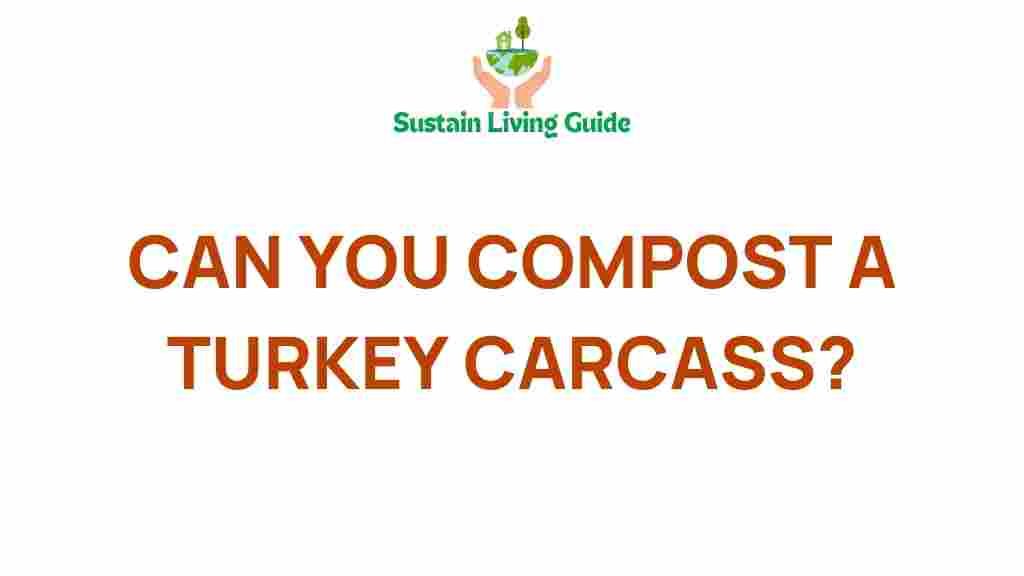Can You Really Compost a Turkey Carcass? The Surprising Truth About Compost
The holiday season often brings families together, and many of us enjoy a delicious turkey feast. However, after the festivities come to an end, we’re left with the question: what do we do with the leftover turkey carcass? One environmentally friendly option that many are curious about is composting. Can you really compost a turkey carcass? In this article, we’ll explore the surprising truth about composting turkey remains, helping you determine if this is a viable option for your home composting system.
Understanding Composting
Before diving into the specifics of composting a turkey carcass, it’s essential to understand what composting is and how it works. Composting is a natural process that involves the decomposition of organic materials, turning them into nutrient-rich soil. This process relies on microorganisms, moisture, and oxygen to break down materials efficiently.
Here are some key components of composting:
- Green Materials: These are nitrogen-rich items like food scraps, grass clippings, and green leaves.
- Brown Materials: Carbon-rich items include dried leaves, straw, and cardboard.
- Moisture: Adequate moisture is crucial for decomposition, but too much can lead to anaerobic conditions.
- Air: Aeration helps to facilitate the breakdown of materials and prevents foul odors.
Can You Compost a Turkey Carcass?
The short answer is yes, you can compost a turkey carcass. However, it’s not as straightforward as composting vegetable scraps or yard waste. Composting meat products, including poultry, requires careful consideration and proper management. Below, we’ll explore the step-by-step process for composting a turkey carcass effectively.
Step-by-Step Process for Composting a Turkey Carcass
1. Prepare Your Composting System
Before adding your turkey carcass to the compost, ensure that your composting system is well-prepared. Here are a few options:
- Hot Composting: This method involves maintaining high temperatures (130°F to 160°F) to kill pathogens and pests. A hot compost pile is ideal for composting meat.
- Compost Bin: Use a closed compost bin to keep animals out and contain odors.
- Trench Composting: Bury the carcass in a trench away from your main compost pile to allow it to decompose without attracting pests.
2. Cut the Carcass into Smaller Pieces
To speed up the decomposition process, cut the turkey carcass into smaller sections. This increases the surface area and allows microorganisms to work more efficiently. Using a sharp knife or cleaver can help with this task.
3. Balance Your Greens and Browns
When composting a turkey carcass, it’s crucial to maintain the right balance of green and brown materials. Since the carcass is a high-nitrogen (green) material, you’ll need to add sufficient carbon-rich (brown) materials to your compost pile. Aim for a ratio of approximately 1 part green to 3 parts brown.
Some excellent brown materials to add include:
- Dried leaves
- Straw or hay
- Cardboard or paper
- Wood chips or shavings
4. Bury the Carcass
Once you’ve prepared the carcass and added sufficient brown materials, bury the turkey carcass deep within the compost pile. This helps to minimize odors and prevents pests from being attracted to the compost.
5. Monitor Your Compost
Regularly monitor your compost pile to ensure it stays moist and aerated. Turn the pile every few weeks to encourage decomposition and maintain optimal temperatures. If you notice any foul odors, it may indicate that your compost pile is too wet or lacking in brown materials.
Troubleshooting Tips for Composting a Turkey Carcass
While composting a turkey carcass is feasible, it can come with challenges. Here are some troubleshooting tips to help you succeed:
- Odor Issues: If your compost smells bad, it may be too wet or have too many green materials. Add more brown materials to balance it out.
- Pests: To deter pests, make sure to bury the carcass deep in the pile and maintain a closed compost system.
- Slow Decomposition: If decomposition is slow, consider chopping the carcass into smaller pieces and ensuring adequate aeration and moisture.
Alternative Disposal Methods
If you’re still unsure about composting a turkey carcass, there are alternative disposal methods you can consider:
- Municipal Yard Waste Collection: Check if your local waste management service accepts meat for composting.
- Animal Feed: Some farmers may accept carcasses for animal feed, but ensure you check local regulations first.
- Burial: If you have space in your yard, you can bury the carcass far from edible plants. This can also enrich the soil as it decomposes.
Conclusion
In conclusion, composting a turkey carcass is indeed possible, but it requires proper management and care. By following the steps outlined above and maintaining a balanced composting system, you can turn your turkey remains into valuable compost for your garden. Remember to monitor your compost regularly, troubleshoot any issues, and consider alternative disposal methods if composting doesn’t seem right for you.
For more information on composting and sustainable practices, check out this resource. Happy composting!
This article is in the category Waste and created by SustainLivingGuide Team
